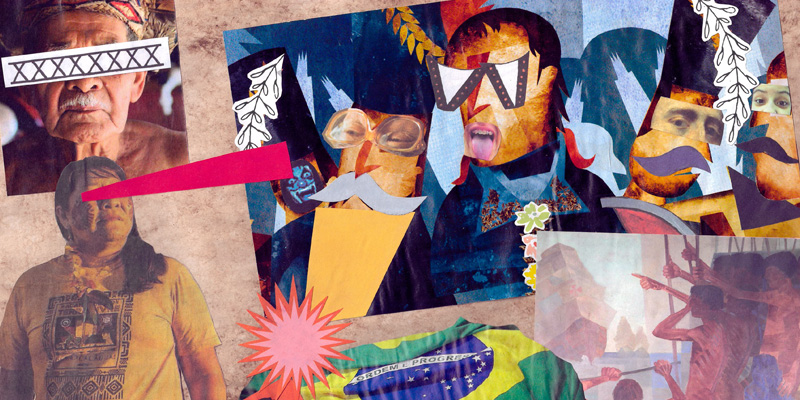
Artigo: João Paulo Lima Barreto
Resumo
O texto apresenta a importância dos anciãos nas sociedades indígenas. Para os povos indígenas do noroeste amazônico, pais, mães e avós são considerados sábios e detentores de conhecimentos: são detentores de kihti ukuse (conjunto de teorias e narrativas míticas), bahsese (práticas de cuidado da saúde) e bahsamori (práticas relacionadas à formação de especialistas, festas, danças, instrumentos musicais), fundamentais para a existência dos grupos sociais. Os mais velhos carregam o status de pensadores, conhecedores e formadores de novas gerações. Para mostrar isso, começo este artigo falando do meu próprio pai, Ovídio Barreto, como um exemplo de kumu, pajé.
Para as sociedades indígenas, os anciãos são professores e equivalem às instituições de ensino. Eles têm um lugar especial no seio dessas sociedades, e não há um limite de idade para exercerem seus papeis especializados. Esse modelo de conhecimento, no entanto, está cada vez mais ameaçado pela presença de instituições estatais, que tentam impor uma política que limita as pessoas mais velhas de exercerem suas especialidades e transmitirem seus conhecimentos, colocando em risco, assim, o modelo de organização social dos povos indígenas.
_____
Abstract
This work aims to underline the importance of the elderly among indigenous societies. For the native peoples of Northwestern Amazon, fathers, mothers and grandparents are all considered to be sages, bearers of the wisdom and of the knowledges fundamental to the perpetuation of social groups: the kihti ukuse (a set of mythical narratives and theories), the bahsese (health care practices) and
the bahsamori (the preparation of specialists, feasts, dances, musical instruments). Elders take on the status of thinkers, experts and of mentors to the forthcoming generations. To demonstrate this, I start by addressing Ovídio Barreto’s, that is, my own father’s example as a kumu, pajé.
For indigenous peoples, seniors are teachers and professors, corresponding to educational institutions. They hold a special place within the bosom of such societies, and age never becomes a hindrance to the exercise of their roles as specialists. This modus of knowing and knowledge, and with it, indigenous peoples very social organization, is presently being put at risk by State institutions and government policies that prevent older people from exercising their specialties and transmitting their knowledges.
______
Resumo (Tukano)
Mahsã buhku turi kahse ukurõ ni ́i ati puri. Poterikarã mahsãma, mari pahkusumuã, mari pahkomãnumia, mari ñekusumuã buhku turi eharã masiri mahsã nima. Kihti ukuse, bahsese, bahsamori masiri mahsã. To werã wiopesari mahsã nima, tuoñari mahsã, ukuri mahsã, bahseri ko mahsã, wiseri karã mahsã mina. Tere yu ́u ati purie uku. Na, buhku turi nirõkarã nirã wema ni ́i uku. Tere uku wãkõgu, yu ́u pahku, Akuto (Ovídio Barreto) kumu ku nisere uku wãkõ. Bahseri ko mahsã ku nirõre, ku porãre Kihti ukuse, bahsese, bahsamori masiri ku weopeosere. Poterikarã mahsãma, buhkurãta nima mama bukuatuarare buerã mahsã kurari kahtisere, até nirõksere Kihti ukuse, bahsese, bahsamori. To werã, nirõkarã nirã wema mahsã buhkurã, mahsiri mahsã nima, bueri mahsã nima, suori mahsã kahtirã nima. Arã, mari pehkahsã nirã, buhku turi kahrãre, mari poterikarã mahsã weroho uña weõpeo nukõtima. Mahsã buhkurãre daratuhtuatima ni ́i uña kahsanukõ, nare so ́o nikarã waya wiseripu nima. Bukurã ni ́i musã, daratutuase mo ́o musã nima ni ́i uku yu ́u ati purire.
_____
Veja e baixe o artigo completo:
—
Baixe a Edição 84 completa da Revista Mais 60 aqui.
Clique aqui para ver edições anteriores da Revista Mais 60.
Utilizamos cookies essenciais para personalizar e aprimorar sua experiência neste site. Ao continuar navegando você concorda com estas condições, detalhadas na nossa Política de Cookies de acordo com a nossa Política de Privacidade.